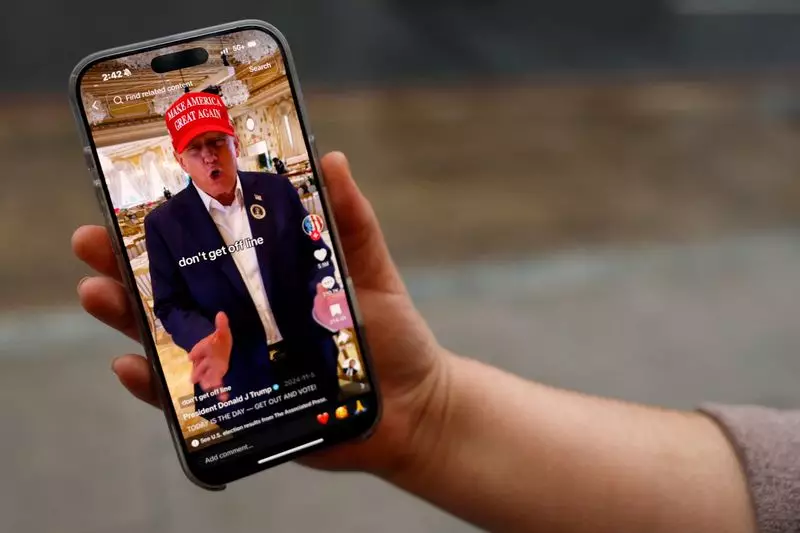The story of TikTok in the United States has become a symbol of the complex and often contentious relationship between technology, politics, and international relations. Once on the brink of an outright ban due to national security concerns over data privacy and affiliations with the Chinese government, the popular video-sharing platform has seen a resurgence following the latest statements from President-elect Donald Trump. This unexpected turn of events has ignited discussions about the implications for users, businesses, and the broader geopolitical landscape.
In a surprising move just before Trump assumed office, TikTok announced that it would be restoring its services in the U.S., attributing this reinstatement to Trump’s expressed commitment to resolving issues surrounding the app. The platform communicated its gratitude to Trump for “providing the necessary clarity” to its service providers, allowing TikTok to cater once again to its vast user base of over 170 million Americans and support small businesses using its platform.
Yet, this turnabout raises crucial questions about the sustainability and legality of such a resolution. Trump’s proposal to delay the enforcement of a law aimed at TikTok underscores the tension between legislative actions and executive decisions. While Trump’s intentions may aim at fostering a business-friendly climate, they also risk undermining the rule of law, which emphasizes adherence to enacted regulations.
The backdrop of this intrigue lies in serious national security concerns pertaining to user data possibly being accessed or misused by the Chinese government. The apprehension surrounding TikTok has led to rising calls from lawmakers demanding a thorough review of its operations. Trump’s previous characterization of TikTok as a potential threat to American interests has transitioned to a viewpoint that recognizes its potential to engage younger voters—a demographic crucial for his political aspirations.
However, this shift perspectives raises ethical dilemmas about prioritizing economic interests over national security. The notion that TikTok’s survival could hinge on political expediency rather than robust regulatory frameworks casts a long shadow over its operational integrity and the trust of its users.
Within the Republican Party, reactions to TikTok’s reinstatement have been far from uniform. A faction within the party has cautioned against bending regulations to accommodate the app’s resurgence without a meaningful divestiture from its Chinese parent company, ByteDance. Senators Tom Cotton and Pete Ricketts have emphasized that any return to normalcy for TikTok hinges upon the company’s compliance with strict divestiture requirements, reinforcing the argument for a systemic and structured approach rather than hasty executive actions.
This intra-party division complicates the discourse further, raising questions about the broader implications for how technology companies operate in the U.S. amid increasing scrutiny over foreign ownership.
In the wake of TikTok’s brief interruption, public sentiment among its user base has been one of anxiety and frustration. The sudden loss of access prompted many users—primarily younger demographics—to seek alternative platforms and solutions, such as virtual private networks (VPNs). Social media trends exhibited a sharp increase in searches for alternatives and workarounds, signifying the app’s importance in users’ daily lives and the ripple effect of its potential closure.
Marketing professionals and influencers reliant on TikTok for their livelihood have vocalized their concerns, demonstrating the app’s economic significance within the digital marketing ecosystem. The potential for a “hair on fire” scenario indicates a critical need for businesses to adapt swiftly to changes that could significantly impact customer engagement and advertising strategies.
As TikTok prepares for a new chapter under the incoming administration, speculation about its long-term future continues to swirl. Will it settle into a stable coexistence within a regulated framework that alleviates national security concerns? Or will it find itself again on the cutting block as political tides shift?
The emergence of other contenders in the social media sphere, like RedNote, reflects growing competition, pushing TikTok to innovate and maintain its user engagement. Moreover, ongoing discussions about potential mergers and shifts in ownership could either stabilize or further complicate TikTok’s standing in the U.S. market.
The revival of TikTok symbolizes more than merely a platform’s return to service; it raises critical issues surrounding data security, legal accountability, and even international relations. As the app navigates these complexities, vigilant scrutiny from authorities, users, and competitors alike will shape its journey moving forward. Ultimately, the trajectory of TikTok serves as a reminder of the intricate interplay between technology and governance in our increasingly connected world, one where the stakes are as high as ever.

